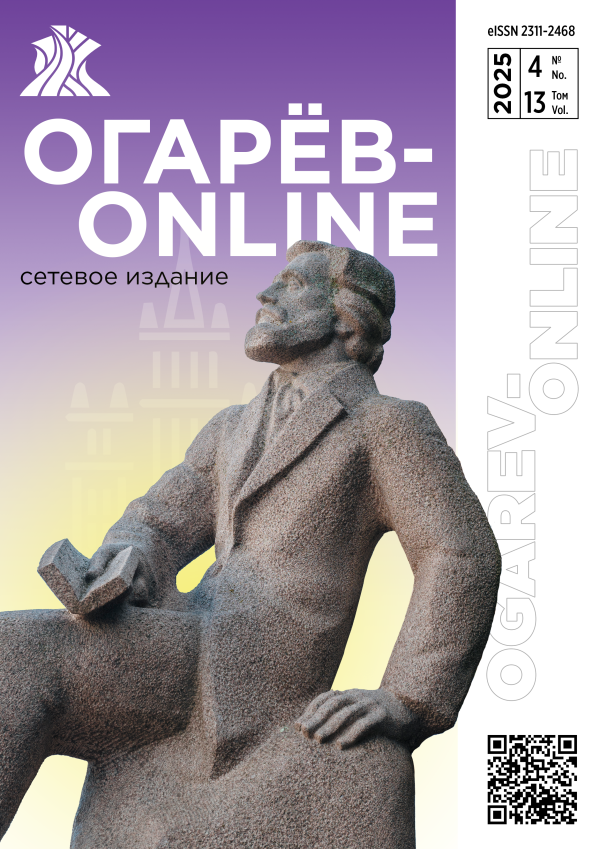Vol 10, No 6 (2022)
- Year: 2022
- Published: 01.06.2022
- Articles: 10
- URL: https://ogarev-online.ru/2311-2468/issue/view/19351
Full Issue
Formation of digital dictatorship as a current socio-political problem
Abstract
The article analyzes the use of information technologies in various countries, which in the near future can lead to the formation of the so-called "digital dictatorship", i.e. systems of total control of the authorities over citizens. The problem has become significantly more urgent because of the introduction of emergency measures to combat the COVID-19 pandemic. From the point of view of socio-political practice, this contains the threat of potential fragmentation of existing social institutions and deformation of the identity of individuals.
 2-8
2-8


The role of new information technologies in the election campaign of Donald Trump in the 2016 United States presidential election
Abstract
The article is devoted to the study of information technologies, which represent the future of political communication. The study shows how big data allows you to track user behavior and, in accordance with the data obtained, adjust the strategy of the election campaign, and the digital footprints of users help political technologists create the most accurate image of the voter.
 9-15
9-15


Problems and prospects of American federalism in pandemic conditions
Abstract
The article deals with the current problems of the American model of federalism in the context of the coronavirus pandemic. The views of domestic and foreign authors on the prospects for the development of federalism in the United States are analyzed. The author comes to the conclusion that the current stage of federal relations in the United States is characterized by decentralization, but tends to centralization.
 16-22
16-22


Conservative ideology in Great Britain: stages of formation
Abstract
The article deals with the formation of British conservatism. Particular attention is paid to the ideas of E. Burke as the founder of this direction. As a result, the history of the emergence and development of conservatism was comprehensively studied as well as its influence on the history and culture of Great Britain.
 23-29
23-29


East Timor and South Sudan: struggle for independence in the XXI century
Abstract
The article considers the specifics of the modern struggle for independence on the example of East Timor and South Sudan secessions. The author analyzes the prerequisites of conflict in these regions, the course of armed conflicts and their results. The work presents a study of the characteristics and features of the struggle for independence in the XXI century.
 30-37
30-37


Nature of modern protest: Belarus and Kazakhstan
Abstract
The specifics of modern protest has been analyzed on the example of Belarus 2020 and Kazakhstan 2022 protests. The main factors influencing the protests have been revealed and analyzed, including the causes of protests and socio-economic situation in the two countries on the eve of mass actions. The reaction of the regimes to different types of protests was studied, and the conclusion about the greatest influence of the demographic factor was made.
 38-45
38-45


Priorities of relations between the Russian Federation and the Republic of Abkhazia
Abstract
The article discusses current trends in economic interaction and military-political cooperation between Russia and the Republic of Abkhazia. The latest data on trade between the two states, information on investment projects and the results of their implementation were analyzed. The conclusion is made of the leading role of Russia in ensuring the territorial and economic security of Abkhazia and its influence on the formation and implementation of the state policy of a partially recognized state.
 46-52
46-52


Priority biological threats to the national security of the Russian federation
Abstract
The article considers priority biological threats that can cause significant damage to the national security of the Russian Federation, in particular to undermine the sovereignty and territorial integrity of the state. The authors investigate the emergence of an extremely dangerous epidemiological situation caused by the COVID-19, and also analyze the turbulent and fundamentally vulnerable state of the Russian Federation from attacks using biological weapons.
 53-60
53-60


Candidate image: concept and current typologies
Abstract
The article is devoted to the analysis of various interpretations of the concept of candidate image as well as approaches to the typology of this phenomenon. The author comes to the conclusion that the current classifications of the candidate's image should be synthesized into a common universal typology.
 61-66
61-66


Principles of state policy in social protection of the population: ethical analysis
Abstract
The article considers the political, legal and ethical foundations of social work. Particular attention is paid to their application and consolidation in the professional and ethical code of social workers. In addition, the article identifies and describes the requirements for the moral and ethical principles of social work, the sustainability of modern social work to the realities of Russian society.
 67-72
67-72
















